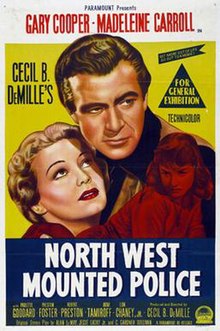|
North West Mounted Police (film)
North West Mounted Police is a 1940 American epic north-western film produced and directed by Cecil B. DeMille and starring Gary Cooper and Madeleine Carroll. Written by Alan Le May, Jesse Lasky Jr., and C. Gardner Sullivan, and based on the 1938 novel The Royal Canadian Mounted Police by R. C. Fetherstonhaugh, the film is about a Texas Ranger who joins forces with the North-West Mounted Police to put down a rebellion in the north-west prairies of Canada. The supporting cast features Paulette Goddard, Preston Foster, Robert Preston, Akim Tamiroff, Lon Chaney Jr. and George Bancroft. Regis Toomey, Richard Denning, Rod Cameron, and Robert Ryan make brief appearances in the film playing small roles. North West Mounted Police was DeMille's first film in Technicolor. The film premiered on October 21, 1940 in Regina, Saskatchewan. The film received an Academy Award for Best Film Editing (Anne Bauchens).[2][3][N 1] PlotTexas Ranger Dusty Rivers is sent to Canada in pursuit of outlaw Jacques Corbeau, arriving in the midst of the 1885 Riel Rebellion. Dusty meets nurse April Logan and is attracted to her, causing rivalry with another suitor, Canadian Mountie Sergeant Jim Brett. Meanwhile, April's brother, Mountie Ronnie Logan, is madly in love with Corbeau's daughter, Louvette. These feelings are fully reciprocated, despite them being on opposite sides. Louvette learns that the rebels plan to attack a lookout post guarded by Ronnie and then ambush a Mounties column which is trying to seize an abandoned store of ammunition which would be invaluable to the rebels. By crushing the column, the rebels will demonstrate to wavering Indian forces that the rebellion is worth joining. To keep Ronnie safely out of the ambush, of which he is unaware, Louvette persuades him to leave his post for an hour, and then has him confined by Indians. Dusty helps the Mounties to mount a rearguard action against the ambushers. Sergeant Jim then leads a small detachment from the fort to the Indian camp where he persuades them to allow him to arrest Corbeau. Dusty tracks down Louvette's hideout and convinces Ronnie to surrender to face a desertion charge, but Ronnie is killed in a case of mistaken identity. Afterwards, Dusty accepts April’s decision to stay with Jim and returns to Texas. CastAs appearing in North West Mounted Police, (main roles and screen credits identified):[5]
ProductionDue to budget restrictions, North West Mounted Police was filmed at sound stages at the Paramount lot as well as on location in Oregon and California, even though the film was based on a real life incident in Saskatchewan, Canada.[6] Principal photography began on March 9, 1940. Although Gary Cooper stars, the lead role was originally given to Joel McCrea, on contract at that time, but Cooper traded roles so that McCrea could star in Foreign Correspondent (1940).[7] DeMille narrated portions of the story, a practice he followed in all of his Technicolor films.[8][N 2] ReceptionCritical responseIn homage to the historical region portrayed in North West Mounted Police, the world premiere for the film took place on October 21, 1940, in Regina, Saskatchewan, Canada.[9] The film became Paramount's biggest box-office hit of 1940 and garnered some favourable contemporary reviews from critics, as well.[6] Variety noted: "... scripters weave a story which has its exciting moments, a reasonable and convincing romance ..."[10] Later reviews were much less complimentary. Leonard Maltin called it "DeMille at his most ridiculous ... [a] superficial tale of Texas Ranger searching for fugitive in Canada. Much of outdoor action filmed on obviously indoor sets."[11] North West Mounted Police was listed in the 1978 book The Fifty Worst Films of All Time (1978). Awards and nominations
Notes
References
Bibliography
External links |
||||||||||||||||||||||||||||||||||||||||||||||||||||||||||
